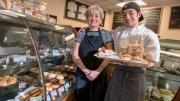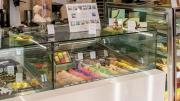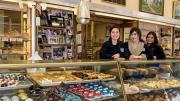People are picky about pastries. One lady’s scone is another’s scorn. A gentleman’s prized honey-glazed donut is another’s adamant do not. What follows is a very short list of bakeries that rose above derision during an impromptu office taste-test.
A clear favorite, the “azuki cream,” from Japonaise Bakery & Café, in Brookline, is a dreamy pillow of croissant pastry baked with a smear of red bean paste at the bottom, then cooled and pumped full of fresh whipped cream. The $3.50 treat is not fussily sweet, notes Takeo Sakan, who does the baking alongside his mother, Hiroko Sakan, who opened the shop in 1985.
Missing the Asian-French-fusion pastry of her native land (U.S. baked goods historically lean toward hefty English varieties), Sakan read cookbooks, experimented with Asian and French techniques, and listened to her own “good palate,” her son says, “then created what she liked.” In addition to the azuki cream, the Sakans produce a delectable chocolate cake layered with sliced bananas ($3.75 a slice) and a wonderful Japanese white bread, shoku pan, made with milk ($3.75) or heavy cream ($4). The business is being transferred to Takeo, so his mother can retire. “But it’s hard for her to just go, after she has been doing this for so long,” he says. “And at the same time, I can do all the bread myself, but I still need some help on the cakes.”
Established in 1958 by French émigré Antoine Khachadourian, Antoine’s Pastry Shop, in Newton, is still a family-run operation, now led by his brother, René. Of the French- and Italian-inspired goodies, the standouts include the rum baba, ricotta cheese cup, and the cannolis, fresh-filled to order (all $2.75). “Everything is made here, in the back,” René says, gesturing over the glass cases filled with cookies—half moons (or “black and whites”), rainbow-sprinkle-dipped, and nubby pine-nut—toward the kitchen. “We do it the old-fashioned way,” he adds, with “fresh eggs and butter, flour, sugar, honey—all the basics.”
For similarly no-nonsense, hand-cut donuts (unlike those maple-infused numbers dotted with bits of hand-cured bacon and free-trade chocolate), go to Linda’s Donuts, in Belmont, supposedly named for the former owner’s daughter. She’s not there now, but patrons will find Arthur Paloukos serving bags, boxes, and plates of donuts—most popularly, the Boston cream, raspberry-apple jelly, and chocolate honey-dipped sweets ($1.25 each)—that his father, John, arrives every day at 4 a.m. to make. The cozy shop opens two hours later, when regulars shuffle in and take up the 18 seats, primed for a mug of coffee and a gab session. Soon, others line up, construction workers and cops, kids and their parents, all pining for that warm hunk of sweet dough that will carry them through the day.
For fancier fare, head a few blocks east to Praliné Artisanal Confections. French-born owner and pastry chef Sophia Benyamina opened it a year ago and specializes in macarons—pistachio, orange blossom, chocolate, and raspberry, among others, $2.50 each—and French tea cakes, including madeleines, cannelés (cylinders of caramelized crust with custardy interiors), and financiers (springy cakes, typically almond-flavored), that cost around $3: “a lot of butter and sugar,” comments the salesgirl. Also on offer are tarte aux fruits; chocolate-honey marshmallows; and almost-too-pretty-to-eat handmade chocolates.
More eclectic, with a grungy-chic vibe, is Canto 6 Bakery. Located on a busy street across from the police station in Jamaica Plain, the seven-seat, storefront café offers sweets that range from the rustic salted chocolate-chunk cookies ($2.95) and cranberry oat bars ($2.25) to the refined bostok (sliced brioche topped with apricot jam, frangipane, and almonds; $3.95), raspberry-apple galette ($2.95), and palmiers (those crunchy, buttery pastries also known as “elephant ears”; $2.50). Don’t leave without a tappo ($1.25): Italian for bottle-stopper, this dense shot of crusty chocolate cake has a molten center.
Customers love the loaves at Clear Flour Bread, in Brookline, where the kitchen adheres fiercely to traditional European baking and pastry techniques. But excellent, too, are the scones, cookies, and croissants (from $2.95 to $3.50). The hard-to-find French-style gibassier ($3.95), an anise-laced cushion spiked with bits of candied orange peel, won the highest marks in the tasting. But the bakery does not wholesale its pastries, warns general manager Inga Sheaffer: “If you want those, you have to make the trip.”










